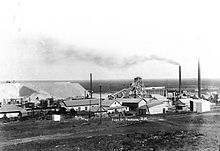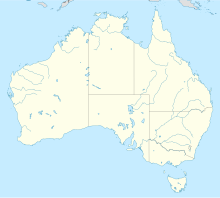Gwalia Gold Mine

Gwalia Gold Mine c.1921
|
|
| Location | |
|---|---|
| Location | Gwalia |
| State | Western Australia |
| Country | Australia |
| Coordinates | 28°55′14″S 121°20′04″E / 28.92056°S 121.33444°ECoordinates: 28°55′14″S 121°20′04″E / 28.92056°S 121.33444°E |
| Production | |
| Production | 82,795 |
| Financial year | 2008-09 |
| History | |
| Opened | 1896 |
| Owner | |
| Company | St Barbara Limited |
| Website | St Barbara website |
| Year of acquisition | March 2005 |
The Gwalia Gold Mine is located at Gwalia, a few kilometres south of Leonora, Western Australia. It was originally established by Welsh miners in the late 19th century and Herbert Hoover, the later President of the United States, served as the mine manager in its early days from May to November 1898.
It is operated by St Barbara Limited. Apart from Gwalia, St Barbara also operates the Marvel Loch Gold Mine at Marvel Loch and owns the Tarmoola Gold Mine, which is placed in care and maintenance.
All three mines were previously owned by the now defunct mining company Sons of Gwalia Limited. Sons of Gwalia went into administration on 30 August 2004 and the company's gold mining operations were sold to St Barbara in March 2005 for A$38 Million, having been valued by the Sons of Gwalia directors at A$120 Million. While Marvel Loch was operational before and after the sale, the Gwalia mine was already placed in care and maintenance at the time of the transaction. A fourth mine, the Carosue Dam Gold Mine, ceased operation in June 2005 and has since been sold by St Barbara.
It was established in 1896 as the Sons of Gwalia mine. It was referred to in the Welsh-language press as Aur-gloddfa Meibion Gwalia = (the) goldmine (of) (the) Sons (of) Gwalia. Gwalia is a medieval Latin name for Wales which became popular in Welsh-language poetry in the nineteenth century.
The Sons of Gwalia reef was discovered by three prospectors who worked it for a brief time. After selling out to George Hall for £5,000 the latter recouped his investment after only one month. In search for additional capital, Hall began negotiations with a London firm, Bewick Moreing, who sent Herbert Hoover, a 23-year-old mining engineer, to the site. Hoover recommended Bewick Moreing purchase the mine, which they did with a cash commitment of £100,000 on 17 November 1897. He suggested himself as manager of the project and successfully reduced costs at the mine by hiring Italian labour.
...
Wikipedia

